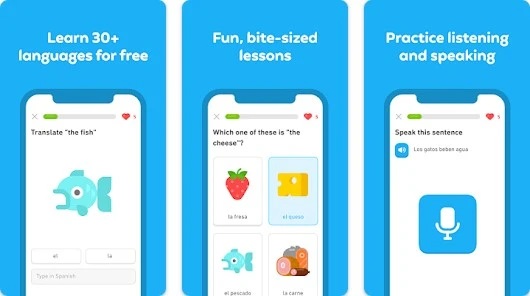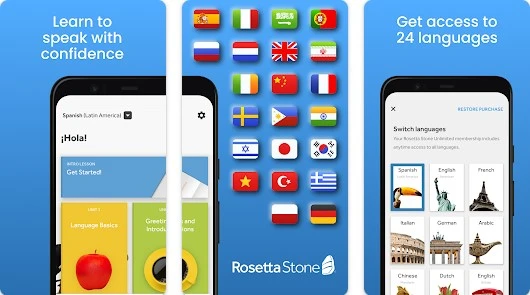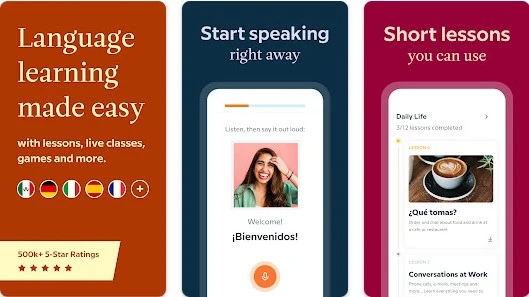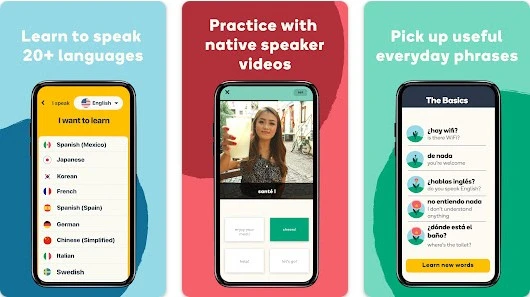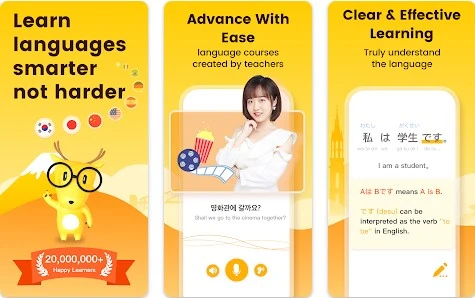Language learning apps, especially if you’re trying to do it on your own. Fortunately, there are now a variety of language learning apps available that can help make the process both fun and effective.
Learning a new language can be a challenging but rewarding experience. With the advent of technology, language learning apps have become a popular and convenient way for people to learn a new language. These apps offer a range of features, from interactive lessons to personalized learning plans, making language learning more accessible than ever before. In this blog post, we will be discussing the top 5 best language learning apps that are available today. Whether you are a beginner or an advanced learner, these apps offer a variety of tools and resources to help you achieve your language learning goals.
1. Duolingo
Duolingo is one of the most popular language learning apps available, and for a good reason. It is free, easy to use, and offers a wide range of languages to choose from. Duolingo gamifies the learning process, making it fun and engaging for users. The app offers lessons in reading, writing, listening, and speaking, with interactive exercises that test your knowledge.
Features
Duolingo offers a range of features to help users learn a new language, including interactive lessons, grammar tips, vocabulary practice, and speech recognition technology. The app also offers a feature called “Duolingo Stories,” which allows users to practice their reading and listening skills by reading short stories in their target language.
Pros:
- Free
- Offers a wide range of languages
- Gamifies the learning process
- Interactive exercises that test your knowledge
Cons:
- Not suitable for advanced learners
- Limited grammar instruction
- Limited speaking practice
2. Rosetta Stone
Rosetta Stone is one of the most comprehensive language learning apps available. It offers immersive language learning through interactive exercises, and it focuses on teaching users how to speak and think in their target language. The app is not free, but it offers a free trial period for users to test out the app.
Features
Rosetta Stone’s immersive approach to language learning involves using pictures and audio to teach vocabulary and grammar, with no translations provided. The app also offers speech recognition technology, which helps users practice their pronunciation and provides immediate feedback.
Pros:
- Immersive language learning
- Comprehensive instruction
- Focuses on teaching users how to speak and think in their target language
Cons:
- Not free
- Limited grammar instruction
- Limited feedback on writing and speaking exercises
3. Babbel
Babbel is a language learning app that is perfect for beginners. The app offers courses in 14 different languages, with interactive lessons that cover grammar, vocabulary, and conversation. Babbel also offers a speech recognition feature that allows users to practice their pronunciation.
Features
Babbel offers a range of features, including interactive lessons, grammar explanations, vocabulary practice, and speech recognition technology. The app also provides personalized learning plans and the ability to review previous lessons.
Pros:
- Perfect for beginners
- Offers courses in 14 different languages
- Interactive lessons that cover grammar, vocabulary, and conversation
- Speech recognition feature that allows users to practice their pronunciation
Cons:
- Limited advanced courses
- Limited writing exercises
4. Memrise
Memrise is a language learning app that uses flashcards and gamification to teach users new words and phrases. The app offers courses in over 20 different languages, and it focuses on teaching users practical, everyday vocabulary. Memrise also offers a speech recognition feature that allows users to practice their pronunciation.
Features
Memrise offers a range of features, including interactive lessons, video and audio content, and a variety of learning games. The app also offers personalized learning plans and the ability to connect with native speakers for conversation practice.
Pros:
- Uses flashcards and gamification to teach vocabulary
- Offers courses in over 20 different languages
- Focuses on teaching practical, everyday vocabulary
- Speech recognition feature that allows users to practice their pronunciation
Cons:
- Limited grammar instruction
- Limited conversation practice
5. Lingodeer
Lingodeer is a language learning app that offers courses in 13 different languages. The app focuses on teaching grammar and vocabulary through interactive lessons, and it offers a wide range of exercises that test users’ knowledge. Lingodeer also offers a speech recognition feature that allows users to practice their pronunciation.
Pros:
- Offers courses in 13 different languages
- Focuses on teaching grammar and vocabulary
- Interactive lessons that test users’ knowledge
- Speech recognition feature that allows users to practice their pronunciation
Cons:
- Limited conversation practice
- Limited writing exercises
Which app is best for beginners?
For beginners, we recommend Duolingo or Babbel. Both of these apps offer courses in a wide variety of languages and use a gamified approach to language learning. This makes the learning process fun and engaging, while also helping beginners build a solid foundation of language skills.
What app is best for advanced learners?
For advanced learners, we recommend Rosetta Stone or Memrise. Both of these apps use a more immersive approach to language learning, which is great for learners who already have a basic understanding of the language. Additionally, Memrise offers a variety of courses that can help advanced learners improve specific areas of their language skills.
How effective are language learning apps?
Language learning apps can be very effective, especially when used in conjunction with other language learning resources like textbooks, conversation partners, and language classes. However, it’s important to remember that learning a language is a long-term process and requires consistent practice and dedication.
Conclusion
Learning a new language has never been easier, thanks to the many language learning apps available in the market. Whether you are a beginner or an advanced learner, there is an app out there that can help you achieve your language learning goals. We hope that this article has helped you
 Atechguide Online Banking & Android App
Atechguide Online Banking & Android App
